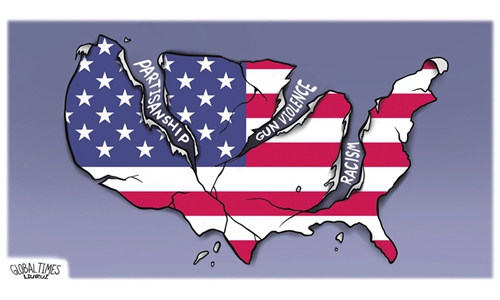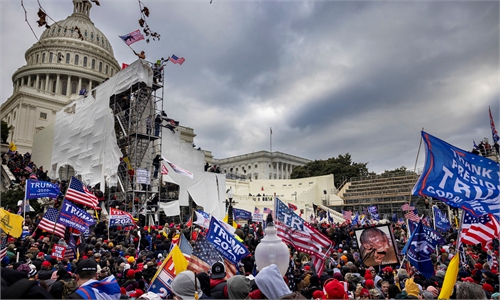
Trump supporters clash with police and security forces as people try to storm the US Capitol on January 6, 2021 in Washington, DC. Photo: AFP
When delivering an address on the anniversary of the January 6 Capitol riots, US President Joe Biden blasted his predecessor Donald Trump and his supporters for attacking US democracy. Meanwhile, Biden once again did his utmost to defend the US-style democracy. At a time when US-style democracy is increasingly becoming a model of "bad democracy," why do some US political elites still cling to the procedural and formal legitimacy of Western democracy?
In a sense, procedural democracy and the stubborn cognition of its "justice" are the notions and systems that evolved from the classical democracy after the rise of modern industrial society.
One of the main sources was the political rationalism once thought to represent the advanced. The arrogance of such a political concept makes it difficult for people living in the West to impartially justify the lifestyles and values of other ethnic groups and races. Instead, they tend to position all systems that do not meet Western criteria to the opposite of "democracy" - the so-called authoritarian.
A second source is modern procedural law with prominent features of formalism. Based on "due process," the procedural law originating from Western tradition takes the efficiency of judicial process advancement as the supreme principle. It has artificially created a political and legal space in which, according to the principle of presumption of innocence, everyone accused of any crime is considered innocent as long as flaws are found in a series of procedures such as investigation, review and prosecution, and trial, even if the accused has been considered guilty in terms of facts.
However, it is the plaintiff who is actually harmed and infringed upon by the justice of procedural law.
From this perspective, the judicial system of modern Western countries spends a lot of taxpayers' money to maintain "decency" and protect the "human rights" of criminals but often ignores the victims. Western democracy keeps taking the moral high ground under the banner of "procedural justice," advocating ideas such as "one person, one vote." However, it actually has to deal with the increasing deterioration of democracy and the resulting political, economic and social problems. This is also related to the West's obsession with the rule of law purely through procedure.
A third source is the natural form of modern civilization that revolves around the capital. In the post-Cold War era, the hegemony of transnational monopoly capital is exemplified as the uncontrolled expansion and growth of a market economy based on the hegemony of the stock and money market.
This echoes with concepts and patterns of the rule of law in Western democracies, especially in the US. The democratic system in the West is known for creating "consent." But when it comes to asking about people's opinions and obtaining their consent by using statistical methods, the complexity and diversity of facts are often transformed into data. Based on these indicators, quantitative models are built, and after several rounds of packaging, "political truths" that many Western elites believe in are created.
Many US polling organizations, even the US Congress, and some Western countries have been cooking up so-called human rights reports since the Cold War era. "Public opinion" in the political market is similar to toxic bonds in the US stock market that are carefully packaged and sold to the world. In a sense, it is the irrational belief and even obsession with numbers and quantification that fuels the maneuverings of some Western politicians who temporarily cater to their voters and use every possible way to gain attention.
Therefore, when criticizing Western-style democracy, we need to look deep into the connotation of its model and understand the limitations of its theoretical roots and thinking patterns.
For a long time, highly abstract numbers, such as polls and demographics, were used to govern, tame and even deceive voters. Nowadays, as a new technological revolution arrives, the information gap created traditionally to shape "consent" is bridged. Thus, the time when Western politicians could shape the world's "public opinion" by using some statistics or quantitative models is fading.
It will be exposed even further that Western-style democracy is boosting and advertising itself.
The author is an associate professor at the School of Marxism at Harbin Institute of Technology, Shenzhen. opinion@globaltimes.com.cn


